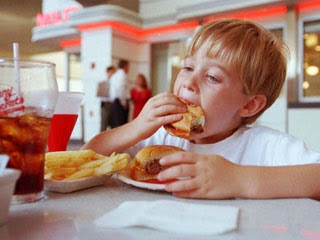Study finds students with heavy fast-food diets have test scores about 20% lower than those who don’t east fast food

The study, published online in the journal Clinical Pediatrics, found that “The more frequently children reported eating fast food in fifth grade, the lower their growth in reading, math and science test scores by the time they reached eighth grade,” says an Ohio State University news release.
Specifically, the study found that children who ate fast food four to six times per week, or every day, had test-score gains in all three achievement areas that were about 20 percent less than those of children who did not eat any fast food in the week before the survey.
“There’s a lot of evidence that fast-food consumption is linked to childhood obesity, but the problems don’t end there,” said Kelly Purtell, lead author of the study and assistant professor of human sciences at Ohio State. “Relying too much on fast food could hurt how well children do in the classroom.”
The study included 11,740 students who were tested in reading/literacy, mathematics and science in both fifth and eighth grades. They were also given a food consumption questionnaire in fifth grade.
The researchers tried to accounted for many other reasons that might have influenced the results, including how much children exercised, how much television they watched, what other foods they ate, their family’s socioeconomic status, and characteristics of their neighborhood and school, according to the release.
While this study establishes a correlation between fast-food consumption and lower grades, it does not establish the cause of lower grades. However, Purtell said she and the other authors are “confident fast food explains some of the difference in achievement gains over time.”
Other studies have suggested that it may be related to a lack of nutrients found in fast food, such as iron, and another study suggests that diets high in fat and sugar, found in most fast food, hurt immediate memory and learning processes, the news release says.
“We’re not saying that parents should never feed their children fast food, but these results suggest fast-food consumption should be limited as much as possible,” Purtell said.
